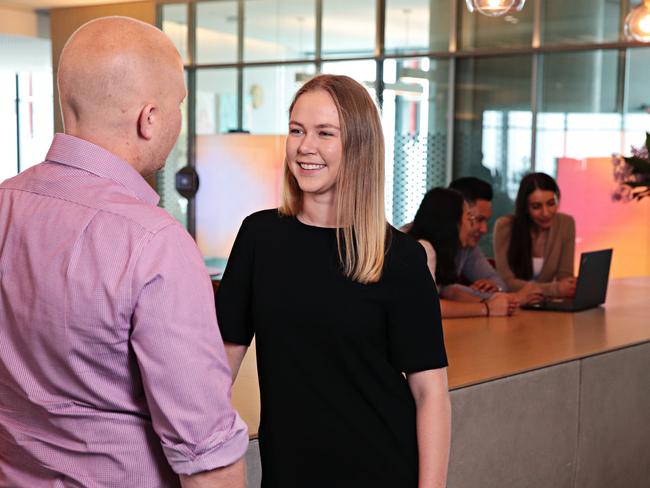Employers and would-be students seeking alternatives to university degrees
Australia’s obsession with university is subsiding, with fewer employers and school leavers seeking out degrees. SEE THE DEGREE-FREE CAREERS AND THEIR PAY
Work
Don't miss out on the headlines from Work. Followed categories will be added to My News.
Exclusive: School leavers stressing about university results can breathe a little easier as employers are turning their backs on university degrees and focusing on in-house training.
The bachelor degree considered a minimum requirement for entry-level jobs just five years ago is no longer a priority for employers, who increasingly offer on-the-job training, and Australia’s biggest growth industries – including aged care and IT – are dominated by roles which do not require a tertiary education.
Exclusive data from job site Adzuna revealed just 3.5 per cent of job ads this year included the phrase “bachelor degree” in the description, down from 6 per cent last year.
Likewise, “bachelor” dropped from 7.2 per cent to 4.2 per cent and “degree” dropped from 13 per cent to 9.5 per cent.
Adzuna chief executive Raife Watson said school leavers who did not get the score they required to go to university need not panic.
“Five years ago, having a bachelor’s degree to find any type of work was almost a minimum requirement, even for ground-level sales positions (but) the landscape has since changed, largely due to the failure of universities in Australia to create and promote courses which meet the gaping skill shortages, predominantly in tech,” he said.
“Furthermore, businesses in Australia are investing heavily in in-house training, especially for junior positions.
“In 2019, companies are focusing more on soft skills such as empathy, problem solving and communication, over high-level qualifications.”

Entree Recruitment general manager Megan Nicholson said employers in sales, human resources, marketing, business support and administration had adjusted their expectations of jobseekers.
“Five years back, everyone had a degree … so there was no difference between anyone anymore,” she said.
“People would study just because that was expected of them even though there might not be a job at the end or they might not have a passion – it was just what their grades indicated they could get into.
“We have seen a really big trend towards not everyone having these uni degrees anymore.”
Career coaching company TwoPointZero’s chief executive Steve Shepherd said bachelor degrees were less important for many digital roles as these were constantly changing and universities could not keep up.
“By the time you study the degree, something new has come along,” he said.
“People are teaching themselves the skills because now we have technology at home that allows us to do it.
“For example, years ago if you wanted to edit photographs you had to do courses in Photoshop, now you can go to YouTube videos.
“No one was teaching social media at school or university, but social media managers are working for large corporations … they probably learnt that as 15-year-olds on their Instagram accounts.”

MORE NEWS
Employers take twice as long to hire new recruits
Work in the funeral industry is evolving
AustCyber national workforce development program director Owen Pierce said a lot of people working in cybersecurity did not have any formal post-school education.
“Increasingly, employers are looking for a diverse range of skill sets and not all of those are taught at university per se,” he said.
“There has been a massive uptick in employers looking for VET (vocational education and training).
“It also boils down to the nature of the job, because cybersecurity is not one job, there are in fact 52 different jobs in the industry.”
An October report from the Department of Education revealed declining interest in university from students over the past two years.
Domestic applications to study undergraduate degrees were down 2.6 per cent in 2018 then down another 1.3 per cent in 2019.
Most states and territories recorded a drop this year, including South Australia (down 8.4 per cent), the Northern Territory (down 3 per cent), New South Wales (down 2.8 per cent), Western Australia (down 1.9 per cent) and Queensland (down 1 per cent).
However, applications increased in the ACT (up 5 per cent), Tasmania (up 2.9 per cent) and Victoria (up 1 per cent).
Ms Nicholson said the move away from university may also be attributed to a lot of high-demand roles not requiring degrees, such as in aged care and child care.
Federal Government modelling predicted between 2018 and 2023 new jobs would be created for 69,200 aged and disability carers, 27,600 child carers, 25,500 software and applications programmers, 18,200 construction and mining labourers and 11,900 sales assistants and salespersons – all of which did not require a university degree.

HIGHER APPRENTICESHIPS THE NEW BACHELOR?
Neither Tilly Cooper or Liam Bisognin have a degree, but that has not stopped them landing white collar jobs at professional services firm PwC.
Instead, they completed Higher Apprenticeships through the company, gaining a diploma while learning on the job.
Ms Cooper, 20, left university six months into a Bachelor of Commerce to join PwC and is now a senior associate in technology consulting.
“I knew when I started studying commerce it was likely I wanted to go into a company like PwC so I probably would have spent four years to end up here anyway,” she says.
“I have a lot of friends still going through the university process.
“I think (the Higher Apprenticeship is) a great idea and I had a very positive experience with it and felt I was learning at an accelerated pace on the job.”
Ms Cooper was also grateful to be exposed to the technology sector as she had not planned to pursue that line of work.
“I got interview offers with both assurance and technology (when I applied for the Higher Apprenticeship) and by chance my technology interview was first so I got offered that first so took that job,” she said.
“I went to an all-girls school and I think out of our whole grade, one girl went into a technology-based degree.
“If I hadn’t taken this opportunity it would have been a real shame because I wouldn’t have ended up in technology.”

Mr Bisognin, meanwhile, became an assurance team associate working within internal auditing at PwC after his 18-month Higher Apprenticeship program.
He is now also pursuing a Chartered Accountant accreditation.
The 22-year-old said on-the-job training was a better match for his learning style than university study.
“I started a uni degree, did engineering and commerce for a year and a half,” he said.
“I didn’t know many other pathways, didn’t have anything else in mind other than going to university.
“Some people might be better suited to a uni degree but, for myself, I enjoyed learning hands-on because that’s how I learn best.
“Seeing the tangible product, it’s easier to understand the intent of what I am doing.”
Mr Bisognin said young people were now more aware of the different options available besides going to university.
His advice for this year’s school leavers was to not stress if they did not have concrete career plans straight away.
“You are going to work for 60 years, so four or five years working out what you want to do in the grand scheme of things (is not very long) so it’s worth giving everything a shot,” he said.
NINE JOBS THAT DO NOT REQUIRE A DEGREE
Cybersecurity analyst $110,000
Social media manager $80,000
Pilot $70,000
Electrician $70,000
Plumber $70,000
Executive assistant $70,000
Software programmer $70,000
IT support technician $60,000
Real estate agent $60,000
Source: TwoPointZero; SEEK Career Advice
READ MORE EMPLOYMENT NEWS IN THE CAREERS SECTION OF THE COURIER-MAIL, THE HERALD SUN, THE DAILY TELEGRAPH AND THE ADVERTISER
Originally published as Employers and would-be students seeking alternatives to university degrees


